Latest news: We just added a slick new Hardness Conversion Calculator to our G-Wizard software.
Jump To:
Hardness Conversion Chart & Calculator
Rockwell Hardness
Brinell Hardness
Vickers Hardness
Article on Work Hardening / Strain Hardening
Definition of Hardness
Hardness signifies how effectively a solid material can resist permanent deformation when subjected to a compressive force. It's contingent on a wide range of factors including the robustness of intermolecular bonds, ductility, elastic rigidity, plasticity, strain, strength, toughness, amongst many others.
Hardness Tests: Measuring Hardness
There are three ways hardness is typicall measured:
Scratch Hardness
Scratch Hardness testing is based on the idea that harder materials will scratch softer materials.
Indentation Hardness
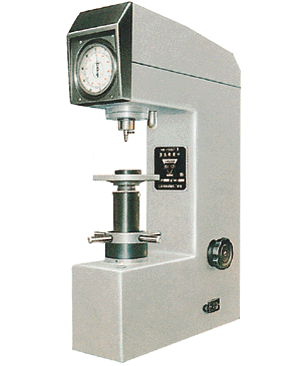
A typical hardness tester...
Indentation hardness measures the resistance of a sample to deformation due to a constant compression load from a sharp object. After the material under test is subjected to a specially loaded and dimensioned indenter, the dimensions of the indentation left behind in the test subject determine the hardness.
This is the most common method of hardness testing used for CNC and machining purposes, and the Rockwell, Vickers, Shore, and Brinell Hardness scales are all based on Indentation Hardness.
Rebound Hardness
In Rebound Hardness measurements, the height of the "bounce" of a dimaond tipped hammer dropped from a fixed height onto the test material determines its hardness.
Rockwell Hardness Test (HR)
In the Rockwell Hardness Test (whose values are referred to with the abbreviation "HR"), a diamond cone or steel ball indenter is used. The indenter is forced into the test material under a minor load, usually 10 kgf. When equilibrium is reached (i.e. no further indentation at that load is happening), a datum position is established. An additional major load is applied, which increases penetration. Removing the major load results in a minor recovery of the material in most cases. The difference between the indentation after that minor recovery and the datum established by the minor load may be used to calculate the Rockwell hardness number.
The various Rockwell Hardness Scales differ in the nature of the indenter as well as the Major Load:
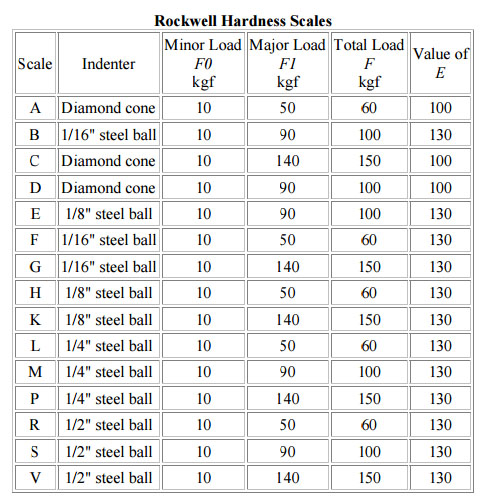
Testing parameters for the various Rockwell Hardness Scales...
The Rockwell Hardness Test is conveient to automate, but it suffers from many arbitrary scales and possible effects from the specimen support anvil. The Vickers and Brinell methods don't suffer from this effect.
Brinell Hardness Test (BHN)
The Brinell Hardness Test consists of indenting the test material with a 10mm diameter hardened steel or tungsten ball subjected to a load of 3000 kg. For softer materials, there are alternate scales using a 1500 kg or 500 kg load to avoid excessive indentation.
The full load is applied for 10 to 15 seconds for iron or steel and at least 30 seconds for other materials. The diameter of the indentation left is measured by a low powered microscope. The Brinell Hardness Number may be calculated from the diameter of that indentation. The average of two measurements taken at right angles is used for the diameter to ensure accuracy.
Compared to the other test methods, the Brinell ball makes the deepest and widest indentation, so the test results average hardness over a wider area. This can result in more accurate results when there are multiple grain structures and other irregularities in material uniformity.
Vickers Hardness Test (HV)
The Vickers Hardness Test uses a diamond indenter in the form of a right pyramid with a square base and an angle of 136 degress between opposite faces. The indenter is subjected to a load of 1 to 100 kgf. the full load is applied for 10 to 15 seconds. The two diagonals left in the surface of the material are measured using a microscope and their average is taken. From this, the area of the sloping surface of the indentation is calculated, and from that the Vickers Hardness may be determined.
Surprisingly, different loading settings give practically identical hardness numbers on uniform material, which is much better than the arbitrary changing of scale with the other hardness testing methods. The advantages of the Vickers hardness test are that extremely accurate readings can be taken, and just one type of indenter is used for all types of metals and surface treatments. The disadvantage is that the machines that take the reading are large floor-standing units (not benchtop), and they're more expensive than Brinell or Rockwell machines.
Other Hardness Scales
The Rockwell, Brinell, and Vickers are the most common hardness scales, but there are many others:
- Shore Scleroscope
- Knoop
- Leeb (HLD): Leeb is a rebound hardness test that was developed in 1975 to provide a portable hardness test for metals.
- Janka Hardness: Janka is used exclusively for wood, but it can be very helpful when CNC'ing wood.
G-Wizard Hardness Conversion Charts & Calculator
Our G-Wizard Calculator software includes a hardness conversion calculator because it has a full set of hardness conversion charts and a calculator built right in on the "Quick Refs" tab:
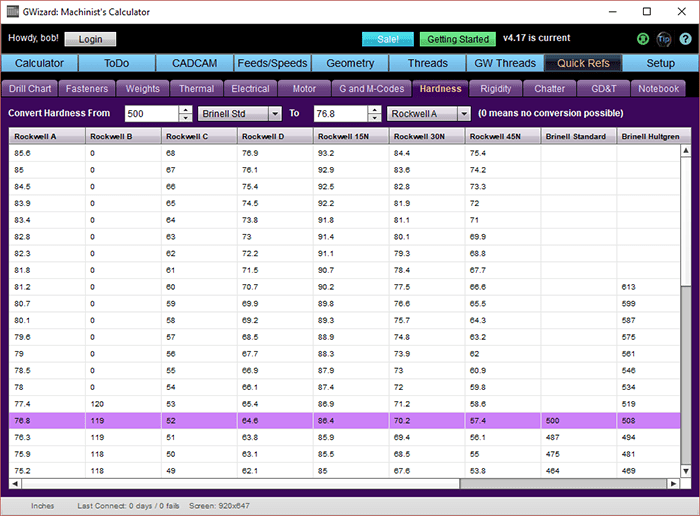
Hardness conversion calculator for Rockwell, Brinell, Vickers, Shore Scleroscope, and Tensile Strength...
The Hardness Conversion Calculator is particularly handy. Enter a from value, select the from units, enter the "to" units, and G-Wizard will give you a value (if there is one) in the new hardness units. Here's a closeup of the unit selector:
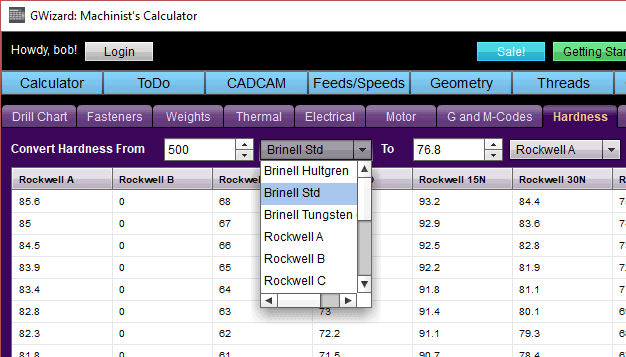
Here's something else-you can get lifetime access to all the reference calculators and materials except the Feeds and Speeds Calculator just by signing up for a Free Trial of G-Wizard. That's right, it is completely free to access all that just by signing up for a free trial and you'll also get all the upgrades and customer service for life! Plus, buy the $79 version and you get up to 1 HP on the Feeds and Speeds too for life.
So what's the catch? Why does anyone ever pay more than $79?
Many hobbyists don't pay more than $79, BTW. The catch is a spindle power limit. When you buy the 1 year G-Wizard for $79, you get 1 year of unlimited spindle power for Feeds and Speeds. When that expires, you get a spindle power limit of 1 HP. That limit is based on however many years you subscribe for. You can increase it any time you like by renewing the subscription. Or, if you don't like subscriptions, you can also by the product outright. And we never charge for updates or customer service.
So go ahead, give G-Wizard a free trial. You'll be surprised at all the time it saves you on things like Tap Drill Sizes, not to mention the longer tool life, better surface finish, and shorter cycle times you'll get from better Feeds and Speeds.
Hardness Conversion Charts and Tables
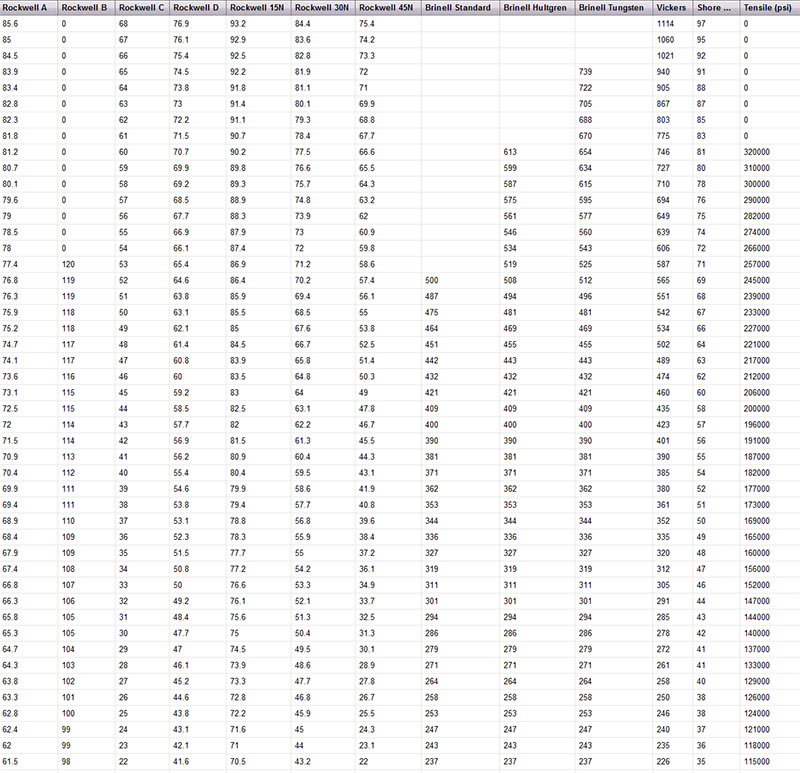
Rockwell A
Rockwell B
Rockwell C
Rockwell D
Rockwell 15-N
Rockwell 30-N
Rockwell 45-N
Brinell Std
Brinell Hultgren
Brinell Tungsten
Vickers
Shore Sclero-Scope
Approx Tensile Strength (psi)
85.6
68
76.9
93.2
84.4
75.4
1114
97
85
67
76.1
92.9
83.6
74.2
1060
95
84.5
66
75.4
92.5
82.8
73.3
1021
92
83.9
65
74.5
92.2
81.9
72
739
940
91
83.4
64
73.8
91.8
81.1
71
722
905
88
82.8
63
73
91.4
80.1
69.9
705
867
87
82.3
62
72.2
91.1
79.3
68.8
688
803
85
81.8
61
71.5
90.7
78.4
67.7
670
775
83
81.2
60
70.7
90.2
77.5
66.6
613
654
746
81
320000
80.7
59
69.9
89.8
76.6
65.5
599
634
727
80
310000
80.1
58
69.2
89.3
75.7
64.3
587
615
710
78
300000
79.6
57
68.5
88.9
74.8
63.2
575
595
694
76
290000
79
56
67.7
88.3
73.9
62
561
577
649
75
282000
78.5
55
66.9
87.9
73
60.9
546
560
639
74
274000
78
54
66.1
87.4
72
59.8
534
543
606
72
266000
77.4
120
53
65.4
86.9
71.2
58.6
519
525
587
71
257000
76.8
119
52
64.6
86.4
70.2
57.4
500
508
512
565
69
245000
76.3
119
51
63.8
85.9
69.4
56.1
487
494
496
551
68
239000
75.9
118
50
63.1
85.5
68.5
55
475
481
481
542
67
233000
75.2
118
49
62.1
85
67.6
53.8
464
469
469
534
66
227000
74.7
117
48
61.4
84.5
66.7
52.5
451
455
455
502
64
221000
74.1
117
47
60.8
83.9
65.8
51.4
442
443
443
489
63
217000
73.6
116
46
60
83.5
64.8
50.3
432
432
432
474
62
212000
73.1
115
45
59.2
83
64
49
421
421
421
460
60
206000
72.5
115
44
58.5
82.5
63.1
47.8
409
409
409
435
58
200000
72
114
43
57.7
82
62.2
46.7
400
400
400
423
57
196000
71.5
114
42
56.9
81.5
61.3
45.5
390
390
390
401
56
191000
70.9
113
41
56.2
80.9
60.4
44.3
381
381
381
390
55
187000
70.4
112
40
55.4
80.4
59.5
43.1
371
371
371
385
54
182000
69.9
111
39
54.6
79.9
58.6
41.9
362
362
362
380
52
177000
69.4
111
38
53.8
79.4
57.7
40.8
353
353
353
361
51
173000
68.9
110
37
53.1
78.8
56.8
39.6
344
344
344
352
50
169000
68.4
109
36
52.3
78.3
55.9
38.4
336
336
336
335
49
165000
67.9
109
35
51.5
77.7
55
37.2
327
327
327
320
48
160000
67.4
108
34
50.8
77.2
54.2
36.1
319
319
319
312
47
156000
66.8
107
33
50
76.6
53.3
34.9
311
311
311
305
46
152000
66.3
106
32
49.2
76.1
52.1
33.7
301
301
301
291
44
147000
65.8
105
31
48.4
75.6
51.3
32.5
294
294
294
285
43
144000
65.3
105
30
47.7
75
50.4
31.3
286
286
286
278
42
140000
64.7
104
29
47
74.5
49.5
30.1
279
279
279
272
41
137000
64.3
103
28
46.1
73.9
48.6
28.9
271
271
271
261
41
133000
63.8
102
27
45.2
73.3
47.7
27.8
264
264
264
258
40
129000
63.3
101
26
44.6
72.8
46.8
26.7
258
258
258
250
38
126000
62.8
100
25
43.8
72.2
45.9
25.5
253
253
253
246
38
124000
62.4
99
24
43.1
71.6
45
24.3
247
247
247
240
37
121000
62
99
23
42.1
71
44
23.1
243
243
243
235
36
118000
61.5
98
22
41.6
70.5
43.2
22
237
237
237
226
35
115000
Be the first to know about updates at CNC Cookbook
Join our newsletter to get updates on what's next at CNC Cookbook.